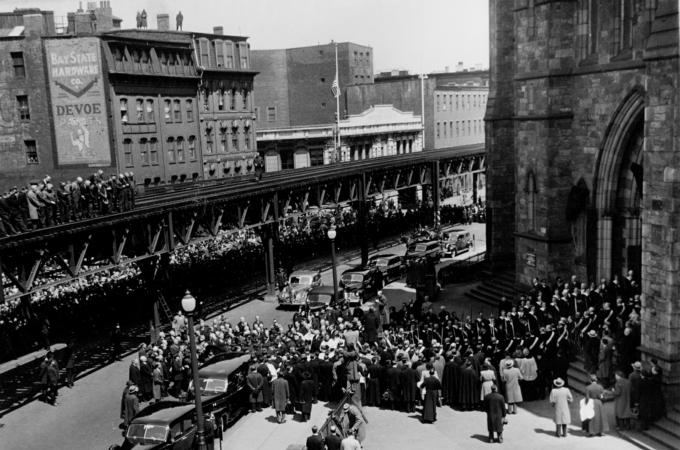The 75th anniversary of Cardinal O'Connell's death
The Monday after Easter, April 22, marked the 75th anniversary of the death of Cardinal William Henry O'Connell, the fifth bishop of Boston, whose tenure spanned 1907 to 1944.
This column has previously discussed Cardinal O'Connell so, in brief, he was born in Lowell, on Dec. 8, 1859. He studied at Boston College and the North American College in Rome, and was ordained there on June 8, 1884. He then returned to the Archdiocese Boston, serving at St. Joseph in Medford and St. Joseph in Boston, before returning to serve as rector of his alma mater in 1895. In 1901, he was installed as the bishop of Portland and would serve as the papal legate to Japan before being installed as the archbishop of Boston on Aug. 30, 1907. He was elevated to a cardinal four years later.
Within the archive's collection resides a eulogy delivered by the then Most Reverend Richard J. Cushing at the Cathedral of the Holy Cross on April 28, 1944.
In stark contrast to his predecessor, Archbishop John J. Williams, Cardinal O'Connell was a notable public presence, embodying the Catholic community's emergence in the public sphere during this era. He is accurately described by Cardinal Cushing as a priest who "harnessed the leaping energies of a keen mind and powerful personality for the race to his goal."
The result of his efforts was a growth in prominence among Catholics in the community, an expanded parochial school system, and elevated status of the Archdiocese of Boston. Cardinal Cushing relates how Cardinal O'Connell himself stated that his three greatest achievements were the establishment of more than 100 parishes, the reorganization of the diocesan seminary, and the sound financial footing on which he left the archdiocese.
Of course, with such ambitions he was "not always understood, even by his own," Cardinal Cushing reflects, "but always steady of purpose and strong of execution, he has been justified by severe tests of eventful years." Ranking highest among these tests are the two world wars through which he guided the archdiocese, coordinating charitable efforts and visiting with soldiers prior to deployment, fueled by his "profound love of his native land and her institutions."
Furthermore, Cardinal Cushing states, "as an administrator, the new Cardinal had few equals." This is reflected in some of the collections deposited in the archive, which were formally organized starting the year he was installed as archbishop. He is also known to have rigorously inspected the finances of institutions and expected them to be self-sufficient, even if he is known to have fallen short of these standards with his personal finances.
"He knew with the certainty gained from a life-time of experience with the souls of men that the true priest can never in this life find rest." After Cardinal O'Connell was laid to rest in a mortuary chapel on the grounds of St. John Seminary, Brighton, he was succeeded by Cardinal Cushing who would also exemplify this statement. He would likewise create scores of parishes, introduce new religious orders to the archdiocese, build dozens of institutions, and continue to display great energy as the archdiocese continued to grow.
For those interested in learning more about Cardinal O'Connell, readers may be interested in two published biographies -- "Militant and Triumphant" by James O'Toole, and "Ambition and Arrogance" by Douglas Slawson. Cardinal O'Connell also published a memoir and a series of sermons and addresses, which are widely available, and his papers are available to view in the archive by appointment.
- Thomas Lester is the archivist of the Archdiocese of Boston.



















